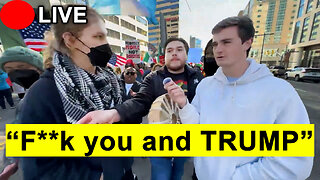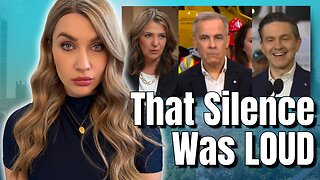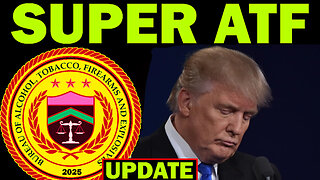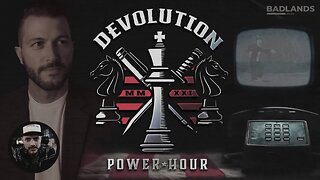Premium Only Content

JD Vance’s Cousin, Nate Vance, Who Served in Ukraine, Speaks Out
Vice President JD Vance’s cousin, Nate Vance—a veteran who served in Ukraine—recently joined CNN’s Erin Burnett to share his candid thoughts on his cousin’s behavior during a high-profile meeting at the White House. The meeting featured Ukrainian President Volodymyr Zelensky alongside JD Vance and former President Donald Trump, an event that has since drawn significant media attention.
A Glimpse into the Meeting
The White House meeting, held during a critical juncture in U.S.-Ukraine relations, brought together influential figures from both domestic politics and international diplomacy. While JD Vance has played a notable role in shaping discussions around Ukraine policy, the spotlight also fell on how he conducted himself during the session. According to sources, his cousin Nate Vance had unique insights into the atmosphere at the meeting, drawing from his own military experience in Ukraine.
CNN’s Erin Burnett sat down with Nate Vance to delve into his perspective on the event. Nate, who has firsthand experience on the ground in Ukraine, explained that such meetings require a careful balance of personal conviction and diplomatic tact—a balance he felt his cousin struggled to maintain.
Nate Vance’s Candid Reflections
During the interview, Nate expressed mixed feelings about his cousin’s behavior. On one hand, he acknowledged the passion and commitment JD Vance brings to discussions about Ukraine—a topic close to both of their hearts due to his own service. “I know my cousin cares deeply about Ukraine and our country’s role in supporting it,” Nate remarked. “His experience here and on the battlefield has given him a unique perspective.”
However, Nate also noted that the conduct he witnessed at the White House did not fully align with what he would have expected from someone with a direct understanding of Ukraine’s realities. “For someone who has fought for Ukraine, I expected a measured, respectful tone when engaging with President Zelensky. The moment the meeting turned overly politicized, it was a bit disheartening,” he explained. Nate went on to add that while strong opinions are necessary, the manner in which they are conveyed on such international platforms can have lasting impacts on diplomatic relationships.
Balancing Passion with Diplomacy
Nate Vance stressed that the situation underscores a broader challenge: balancing personal passion with the need for careful, diplomatic discourse. “When you’re on the frontlines, as I was, you learn that every word matters. It’s not just about supporting a cause; it’s also about the way you support it. In that setting, a shutdown of tact can be interpreted in ways that might embolden political adversaries,” he said.
According to Nate, his cousin’s behavior—though driven by genuine concern—risks lending further credence to critics who argue that political grandstanding may sometimes override practical diplomacy. He urged for a more nuanced approach in future engagements, one where robust advocacy for Ukraine is paired with the kind of strategic restraint that seasoned veterans understand all too well.
The Implications for U.S. Policy
The remarks from Nate Vance have stirred discussions among political analysts regarding the role that personal experience in conflict zones should play in policymaking. Critics of the current approach argue that a mix of passion and pragmatism is essential for effective foreign policy. Nate’s insights reflect this sentiment, suggesting that even well-intentioned actions can backfire if not tempered by diplomatic awareness.
By speaking out, Nate Vance not only offers a rare glimpse into the internal family dynamics behind prominent political figures but also raises important questions about how personal narratives and service experiences should shape national and international discourse. His comments imply that while JD Vance’s commitment to Ukraine is commendable, the manner in which it is communicated on the global stage may need to be recalibrated to prevent misinterpretations or unintended political consequences.
Looking Ahead
The conversation with CNN’s Erin Burnett comes at a time when U.S. involvement in Ukraine remains a key policy issue, and personal anecdotes from those with direct experience are highly valued. Nate Vance’s willingness to share his honest perspective highlights the complexity of merging personal service experiences with the high stakes of international politics.
While JD Vance continues to be a significant voice in shaping policy, Nate’s comments suggest that there might be room for growth in how such positions are articulated. As both domestic and international observers watch closely, it remains to be seen how these internal reflections might influence future diplomatic engagements.
Conclusion
Nate Vance’s interview with CNN’s Erin Burnett provides a thought-provoking look at the delicate balance between passion and pragmatism in international diplomacy. As someone who has served in Ukraine, Nate brings a grounded perspective to the table, one that underscores the importance of measured discourse—especially when addressing a global audience. His reflections on his cousin’s behavior during the White House meeting serve as a reminder that in the realm of foreign policy, every word carries weight, and the art of diplomacy often lies in the restraint as much as in the advocacy.
-
 23:50
23:50
marcushouse
14 hours ago $2.27 earnedStarship Is About to Do Something It’s Never Done Before - A Huge First!
24.4K12 -
 41:56
41:56
CatfishedOnline
2 days agoKinky Man Sends 401k to Romance Scammer from Ghana!
8.18K4 -
 1:53:55
1:53:55
Nick Shirley
17 hours ago $4.49 earnedIRL Confronting Anti-Trump & Anti-Elon Protesters
11.8K77 -
 16:18
16:18
Tactical Advisor
1 day agoRetiring My Patrol Rifle | Old vs New
8.96K2 -
 22:29
22:29
JasminLaine
18 hours agoAwkward Silence After Poilievre FACT CHECKS Reporter—Carney’s Face SAYS IT ALL
12.7K21 -
 9:48
9:48
VSOGunChannel
18 hours ago $0.49 earned25% of ATF Getting Fired? SUPER ATF on Hold?
9.41K13 -
 11:09
11:09
ariellescarcella
22 hours ago"All 4 Of My Kids Are Trans" : NOOOOOO
12.7K22 -
 12:35
12:35
GoldenWebb
1 day ago $0.09 earnedMP5/K Super Safety
7.43K2 -
 2:45:42
2:45:42
Badlands Media
22 hours agoDevolution Power Hour Ep. 343: System Shock
161K153 -
 2:34:40
2:34:40
Sgt Wilky Plays
4 hours agoSunday Morning Coffee and games
12.2K1